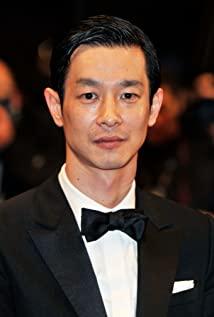Simple and ordinary things in life constitute all the shots of this film, from cafes in Tokyo to the streets to the writer's home, all of which are familiar to us. There is no need for more stimulation and suspense, and the transition of the ordinary plot is ordinary. It's all just for the last amazing blow. I love the calm dialogue Abbas uses to move the plot forward, and the simplistic, understated revealing of information. Mingzi's four messages at the beginning of the film, like the style of the whole film, present us the life status of women in a very simple and general way. Such a way of simplifying the information and bringing it into the perspective of a thinker, but it is not difficult, it is easy Gives a sense of satisfaction. Maybe it’s a bit strange, what I noticed most about this film is that Abbas’s design for the old man’s room, there are many books in the closed space, it looks crowded and warm, showing the taste of an old writer’s life has been warm and poetic character Features. In such a closed space, Abbas opened up another big window, which is located on the street, where the light is poured in, and all living beings are reflected in the window. In this way, the time and space dimensions of the film are suddenly expanded. As a short comment said, the real part of the film lies in the space outside the film. The old man is lonely, longing for company, and no one understands. The opening of this window shows everything. Such a window was the window through which he peeped into the outside, and it was also the source of the last astonishing blow. He peeped out, seeking the tenderness that had passed away, and in the end he was also destroyed in such a search.
In contrast, the old woman opposite the door has long been in love with the old man, but she still has her younger brother to accompany her. The old woman just opened a small window in the wooden wall at the door. As she said in the film, she can feel satisfied by looking at it occasionally. She has companionship and love in her family, and she does not have too much of the outside world. Desires and demands, in this film called "Like a River of Love", she is actually the only one who is actually bathed in love.
Likewise, I think of Yoji Yamada's scene in "Tokyo Family" where the old couple sits at the window watching the Ferris wheel.
The window shows the splendid and prosperous outside world, and two old people sit quietly in the corner of the camera. Such a composition shows the openness of the outside world, and at the same time reflects the closed world of the two old people, which is different from the film "Like a River of Love". The thing is, they are still with each other at this time.
Speaking of the sound effects of this film, a friend who loves Abbas said to me yesterday:
In this film, Abbas is completely integrated into Tokyo. The wind, birds, and the moon have turned into whistles, the whirring of motorcycles, the laughter of children in the streets and alleys, and the natural sounds of Tokyo, Abbas does not filter. processing and even zooming in on some. This approach, in other films, will undoubtedly make the presentation of the subject slightly weaker, but in this film, it makes the film warmer and more intense.
Next, let’s talk about the shortcomings of one or two films. As mentioned above, this film lacks a lot of positive introduction to the protagonist’s information, and it all depends on the audience’s induction and association of details. This adds a degree of freedom to the structure of the film, but also reduces the logic. The promotion of various plots is insufficient and cannot stand scrutiny. For example, why Mingzi's family has no news about Mingzi, why Mingzi has a boyfriend and betrays her smile, why her boyfriend suddenly broke out in the end, and the lack of a lot of cause and effect, let the audience imagine and fill it. , the whole story seems loose and chaotic. I foolishly thought that when Abbas was constructing this Tokyo, he didn't know enough about Tokyo. Various environmental conditions were not fully considered. The plot development and character selection were not what they were supposed to be, but became the director who said I wanted it. Yes, in a modern metropolis, the characters are three-dimensional, but they are not alive. Among them, the character of her boyfriend is particularly thin, and Akiko, who was thought to be three-dimensional at first sight, becomes more and more hollow at the end of the film.
The old man is old and full of memories and fantasies. He saw Akiko, who looked like his wife, and fell in the short company. He was like a river of love.
The boyfriend is young and vigorous and passionately loves Mingzi, but Mingzi is vague about the relationship between the two. Because of this, he is worried all day long, and is afraid of Mingzi's departure, so he is eager to get married. He is someone in love, but only a one-way giver.
Mingzi still has the warmth of love in his heart, crying for helplessness and cowardice that he couldn't see with his grandmother, and feeling confused and disgusted with his sinking life. When asked about her love for her boyfriend, she faltered and couldn't say anything. Contrary to the old man's recollection of love, she has not yet found the meaning of love, and seeks and abuses the love of others to fill the empty soul.
View more about Like Someone in Love reviews











